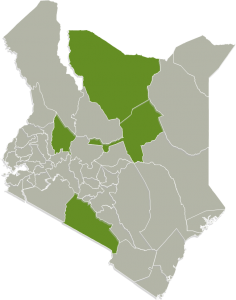| CATEGORY: | CSO |
| CSA PROJECT: | Voice for Change Partnership Project, |
| SCALE: | National and County Coordination actions |
| COUNTY: | Isiolo, Kajiado, Marsabit, Baringo |
| PERIOD OF THE PROJECT: | 2016-2020 |
| GRANT SIZE OF THE PROJECT: |
CENTRE FOR MINORITY RIGHTS DEVELOPMENT

Summary of Actions
CEMIRIDE has, in the last 5 years, been implementing a SNV supported project that partly aims to ensure the mainstreaming of marginalised communities‘ concerns in the formulation and implementation of the CSA strategy and policy. The organization’s actions related to CSA transverse through various scales. At the national level for instance, the advocacy for mainstreaming marginalised communities’ issues in the CSA Policy and Strategy aimed to ensure initiatives that have a national impact. At the County level, ensures the domestication of the CSA Policy and Strategy provisions within the relevant county legislations and policies. Other activities of the organization include generating, appropriately packaging and disseminating evidence-based research on effective implementation of CSA to mainstream and promote the concerns of marginalised communities; Organising the annual Kenya Pastoralists’ Week as an appropriate platform to deliberate on CSA; and Advocacy through marginalised leadership caucuses such as the PPG, PLF and FCDC to ensure appropriate enactment and implementation of policy and legal frameworks friendly to marginalised communities;
Context
Appropriate policies are a key component of stabilising the livelihoods of pastoral systems especially those that are geared towards climate change mitigation. Policies that are well formulated and are adaptive to the needs of pastoral communities, incorporating indigenous knowledge and recognising the role of customary institutions will foster a robust business environment that supports businesses and investments in pastoral systems resulting in communities with enhanced ability to cope with climate change. The policy environment in Kenya is robust with Climate Change laws and institutional frameworks newly established to build economic, social and environmental resilience of communities and individuals to climate change shocks. The policy frameworks are however devoid of a strong pastoralist agenda which leaves pastoralists and their mainstay livestock economic system vulnerable resulting in ineffective solutions for pastoralists’ resilience.
Objective
The long-term goal of the SNV supported project is to achieve climate resilient pastoralist communities with a strengthened voice and participation in climate change policy-making processes in Kenya
Key Interventions
| FARM LEVEL | TARGET (NO OF FARMERS) | CSA INDICATORS MONITORED |
| – | – | – |
| BEYOND FARM LEVEL | TARGET BENEFICIARIES | INDICATORS MONITORED |
| Gender (Youth and Women inclusion in CSA) | Over 7 million pastoralist women and Youth in Kenya | – Gender mainstreaming in CSA initiatives
– Equitable benefits for pastoralist youth in enjoying the opportunities provided in the CSA Strategy |
| Policy and Advocacy | 12 million pastoralists in Kenya | – Enactment and implementation of policies and legislation that promotes pastoralists’ resilience to climate change;Sufficient participation and representation of minorities and marginalised counties in policy processes that affect their welfare |
| CSA based access to markets and value chains | 12 million pastoralists in Kenya | – Linking marginalised community entrepreneurs with online markets for their commoditiesProviding a platform for pastoralist entrepreneurs to showcase and market their products through the annual Kenya Pastoralist Week forum |
| Others | 12 million pastoralists in Kenya | – Increased awareness on the CSA Strategies and Implementation PlanMobilising minorities and indigenous communities to actively engage in the implementation of the CSA Strategy |
Participation In Key Climate & Agriculture Networks
The organisation is a member of the following networks; Kenya Climate Smart Agriculture Multi-Stakeholder Forum (CSA-MSP); Kenya Climate Change Working Group; ASALs Forum, Marginalised Communities NCCAP Technical Reference Group and Kenya Pastoralists Forum.
Involvement in CSA
Relevance of CSA MSP to Work
- Research
- Policy formulation
- Knowledge dissemination
- Coordination and networking
- Communication
- Information about CSA
- Networking
- Learning and exchange
- Reporting and showcasing
- Influence policy environment
Recommendation On Ways To Support MSP
- Developing specific climate smart agriculture policies, legislations, strategies, plans.
- Dissemination of climate smart agriculture knowledge and technologies
- Developing capacities of key actors involved in climate smart agriculture implementation Mobilizing actors and facilitating dialogue on climate smart agriculture issues
- Conduct research to provide scientific evidence Monitoring, evaluation and audit of climate smart agriculture aspects to enhance accountability
RELEVANT LINKS & REFERENCES
Organisation Information and Contact Address In case of Follow Up
Name : Nyang’ori Ohenjo
Email address : nyangori.ohenjo@cemiride.org
Phone address: 0701705620
Organisational Physical address: 1st Exciting Avenue, Exciting Road, Off Magadi Road,
Organisational Website: www.cemiride.org
